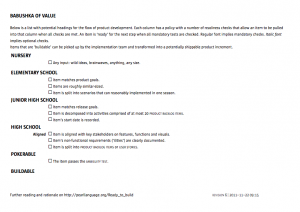Babushka of value
…product development, in the broadest sense.
✣ ✣ ✣
You want a sustainable, ever evolving flow of value creating activities. Flowing Products from Concept to Cash, a Value Stream Map Backbone.
Goals:
- maximize flow
- minimize transitions and boundaries—only introduce them when absolutely necessary
- maximum cohesion, minimal coupling (and dependencies)
Design Principles:
- done for upstream equals ready for downstream
- downstream defines interface for upstream in collaboration with upstream
Therefore:
Create and groom an ever evolving minimal set of quality filters in a value stream.
✣ ✣ ✣
In short:
- Fix the process, not the people.
Each maturity level includes and transcends all previous levels, just like a babushka doll.
✣ ✣ ✣
PDF with example on the right.
Forces:
- flow to ready
- sprint to done
- ready for downstream equals done for upstream
Metaphore unto ready to build is the school system: Nursery School → Elementary School → High School → University.
In the right conditions and within constraints, items develop, unfold, mature in every phase until they are ready for the next. Items ready for the next phase are done in the current.
|
Nursery School |
Elementary School |
Junior High School |
University |
Ready to Poker |
Read to Build |
Ready to Ship | |
|---|---|---|---|---|---|---|---|
|
Policy |
|
|
|
|
|
|
ready to ship, a.k.a. definition of done. |
|
Activities |
|
|
|
|
|
|
|

